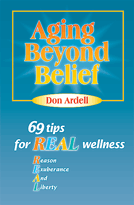 Don Ardell’s tips for aging well are from his book Aging Beyond Belief, 69 tips for REAL Wellness. REAL wellness stands for Reason, Exuberance And Liberty. Don says you can’t buy pills or treatments for REAL wellness−it’s a mindset and lifestyle you control. It’s never to early to let Reason, Exuberance and Liberty be your guide…these tips are for folks of any age. Enjoy.
Don Ardell’s tips for aging well are from his book Aging Beyond Belief, 69 tips for REAL Wellness. REAL wellness stands for Reason, Exuberance And Liberty. Don says you can’t buy pills or treatments for REAL wellness−it’s a mindset and lifestyle you control. It’s never to early to let Reason, Exuberance and Liberty be your guide…these tips are for folks of any age. Enjoy.
TIP 2
Longevity and Aging
Don’t make a big deal about getting older
Everybody does it, it can’t be avoided and there is no cure. Each day is an opportunity to enjoy being younger than you ever will be again, so think and act as vigorously and with as much exuberance as you can muster. Billions are spent annually to slow or, more often, disguise the inevitable markers of aging. Such a waste. All this is futile. As Ecclesiastes would say, “a vanity of vanities, an incomparable excess.” I personally have a soft spot for excess, but not to the point of being incomparably self-delusional about my vanities.
Want in on a little health secret? Move to Canada. An impressive array of data shows that Canadians live longer, healthier lives than we do. What’s more, they pay roughly half as much per capita Americans ($2,163 versus $4,887 in 2001) for the privilege.” (Los Angeles Times, February 23, 2004).
Did you know there’s a mathematical formula that predicts maximal age? There is—and the formula is the basis for the agreed-upon maximum human age being set at 120. (This means I could be writing a second edition to this book in the year 2058.) The formula for maximal age is six times the number of years from birth to biological maturity. Humans take about 20 years to reach maturity, so multiply that by six and there it is—a 120-year limit. (The oldest well-documented age ever was 122.)
Remember, many factors affect longevity, particularly lifestyle choices (e.g., exercise, diet), personality, social life and genetics. Approximately “one-third of aging is heritable, the rest is acquired—that means you are responsible for your own old age.” (Tara Parker-Pope, “What Science Tells Us About Growing Older—And Staying Healthy,” Wall Street Journal, June 20, 2005; Page R1.)
Longevity in this country is nothing to cheer about. When compared with other Western nations, the U.S. is doing worse now than 50 years ago! We are currently losing ground, not making longevity advances, relative to other countries. This might surprise you. Yes, we live longer but our relative position is poorer compared with comparable societies than it was when Eisenhower was president. This despite our having the costliest medical care system on earth!
A World Health Organization study released last year put Canadian life expectancy at birth at 79.8 years, Japan’s at 81.9 and America’s at 77.3!
In 1900, the lifespan in America was 47.3. I shudder to think of all my friends who would be dead now if that figure had not improved over the course of the past century. With no advances, there would be few to no competitors in my 65-69 age group in road races, duathlons and triathlons. A similar 30-year gain in life expectancy into the future would render the average lifespan in the year 2112 a robust 107.3 years.
How might that come about? Perhaps from a wide range of social changes over time, like more nutritious foods and challenging but fun phys ed in schools, campaigns for safer sex and more effective ways to end insane behaviors, like smoking. (It will help also if humanity refrains from setting off any thermonuclear devices.)
Imagine the excitement of watching men and women in their 120s crossing finish lines at road races and multi-sport competitions, to the cheers of the multitudes, with “Rocky” music blaring from loudspeakers. It would be inspirational.
However, it’s also implausible. Wellness is good, wellness is great but I still don’t believe that there will be dramatic advances in phys ed in schools, better diets or other social changes. I hope I’m mistaken about this. If there were such changes and many others consistent with the spread of wellness mindsets like some positive contagion, even that might not produce really dramatic increase in lifespan, though quality boosts would be remarkable. If there are any significant increases in lifespan, the more likely impetus will be improved scientific understanding and attendant manipulation of biological aging processes. But, I’m not wildly optimistic about this scenario, either.
Nor does the U.S. Social Security Administration project dramatic gains for the next century similar to that realized over the last one. Their projections foresee life spans into the mid-80s, which is still pretty impressive. Unless, as some fear, the obesity epidemic gets worse.
In any event, getting older is not such a big deal if you stay younger than nearly everyone else your age! The remaining tips will offer plenty of ideas for doing just that.
-from Aging Beyond Belief, by Don Ardell
 Donald B. Ardell was a pioneer in the Wellness movement. He wrote High Level Wellness: An Alternative to Doctors, Drugs, and Disease, first published in 1976 by Rodale Press, with editions over the years by Bantam Books and Ten-Speed Press. Since then Don has written a dozen additional wellness books, including Die Healthy (with Grant Donovan), 14 Days to Wellness and most recently, Aging Beyond Belief.
Donald B. Ardell was a pioneer in the Wellness movement. He wrote High Level Wellness: An Alternative to Doctors, Drugs, and Disease, first published in 1976 by Rodale Press, with editions over the years by Bantam Books and Ten-Speed Press. Since then Don has written a dozen additional wellness books, including Die Healthy (with Grant Donovan), 14 Days to Wellness and most recently, Aging Beyond Belief.
